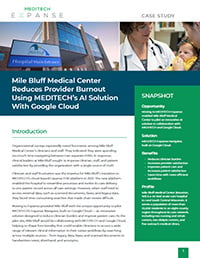Download our case study: Mile Bluff Medical Center Reduces Provider Burnout Using MEDITECH’s AI Solution With Google Cloud

About
Mile Bluff Medical Center (Mauston, WI) is a 40-bed acute care hospital in rural South Central Wisconsin. It serves a population of more than 55,000 residents in an eight-county region throughout its care network, including two nursing and rehab centers, two dialysis centers, and five outreach medical clinics.
Challenge
Mile Bluff Medical Center transitioned to MEDITECH's Expanse EHR in 2021, providing staff with one source of truth after clinicians expressed frustration at navigating between two separate EHRs. This change also allowed Mile Bluff to pilot MEDITECH's Expanse Navigator, built on Google Cloud, an innovative solution designed to reduce clinician burden and improve patient care by searching multiple sources – from legacy data, faxes, and scanned documents to handwritten notes, shorthand, and acronyms.
Execution
Mile Bluff became an early adopter of Expanse Navigator in 2022, joining a partnership between MEDITECH and Google. Pilot user groups comprised diverse healthcare professionals, including doctors, physician assistants, registered nurses, and patient care specialists. Additionally, clinical champions throughout the medical center evaluated the solution's adaptability to various workflows. The pilot program garnered interest from beyond the typical testers, such as HIM and revenue cycle, demonstrating widespread enthusiasm for the solution.
Results
Findings from the Expanse Navigator pilot showed significant time savings, increased efficiencies, and a high user satisfaction rate. Mile Bluff clinicians save an average of 7.5 minutes in prep time per patient, and 86% of users reported being somewhat or very satisfied with the solution:
- Sleep medicine providers save 3 – 6.5 hours per week.
- HIM staff save an average of 16.7 hours per week.
- Pediatricians save approximately 5 minutes per patient, or 7 hours per week.
- Acute care department leads use the solution for sepsis review and reporting of quality items. They save 5 – 7 mins per chart, or 3 hours per quarter.
Quote
“The response [to Expanse Navigator] was overwhelmingly positive. Onboarding went smoothly with the provisioning of users and training. After witnessing [Expanse Navigator’s] impact on their colleagues’ workflow, we received multiple requests for access, ending up with 176 users and expanding to 23 departments.”
Randall Brandt
Physician Assistant in Primary Care
Mile Bluff Medical Center